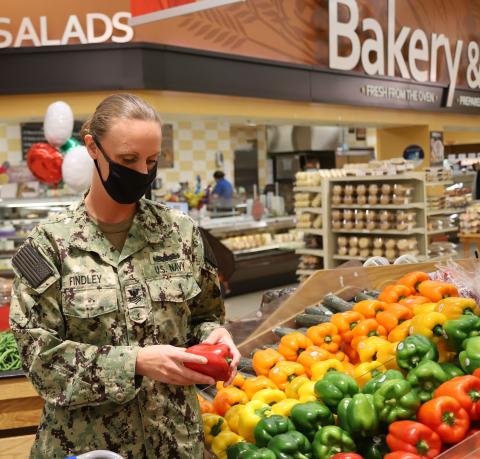BALANCED FINANCES: Commissaries receive clean audit for FY 2020

FORT LEE, Va. – Despite the uncertainty of COVID-19, the Defense Commissary Agency (DeCA) continues to be sure of how it accounts for its funding after independent auditors gave the agency an unmodified opinion for its fiscal 2020 financial statements.
An unmodified opinion means a third-party examination found no substantial discrepancies in the agency’s finances. As such the audit confirms the validity of how the commissary agency operates while delivering the benefit to the military community, said Bill Moore, DeCA’s director and CEO.
“We exist to enhance the quality of life of millions of commissary customers worldwide by providing congressionally mandated savings of 23.7 percent or more,” Moore said. “While we deliver this benefit we also have a responsibility to be transparent in how we account for our appropriations. This clean audit opinion validates our financial credibility.”
The following is a snapshot of DeCA’s financial highlights for fiscal 2020:
- Commissaries generated more than $4.5 billion in annual sales, an increase of $26 million from fiscal 2019
- DeCA received about $995 million in appropriations while returning more than $88 million in sales margin to the U.S. Treasury to offset the commissaries’ official funding
- The agency also processed nearly 70 million transactions in its stores, while delivering nearly $1.5 billion in patron savings
- DeCA received $34.7 million in Coronavirus Aid, Relief and Economic Security (CARES) Act funding, which provided emergency support for federal agencies to respond to COVID-19
The due diligence of every DeCA employee enhanced the agency’s ability to balance its finances and directly contributed to the successful audit, said Cynthia Morgan, the agency’s chief financial officer.
“A successful financial statement audit requires full cooperation from all levels of the organization,” Morgan said. “Audits require timely communication, a smooth and accurate flow of documentation, and consistent follow-up to stay updated throughout the audit process. DeCA’s internal controls are constantly monitored, tested and updated to ensure our financial records are in the best condition possible prior to being tested by the external auditors.”
The independent auditor, CliftonLarsonAllen (CLA), looks at about 500 actions that demonstrate the integrity of DeCA’s internal financial processes and controls and its interactions with external partners, the Defense Finance and Accounting Service (DFAS) and the Defense Logistics Agency.
In a normal year, the audit process can be taxing. However, COVID-19 added necessary safety protocols that restricted physical access for CLA, said Linda Randall, accounting director in the resource management directorate. In the interest of safety, auditors used virtual observations for access to evaluations requiring physical access.
“Even with the COVD-19 challenges, CLA performed a full-scope financial statement audit in accordance with generally accepted government auditing standards – the same as in past years,” Randall said.
DeCA joined five other defense agencies in receiving an unmodified opinion: U.S. Army Corps of Engineers – Civil Works, the Military Retirement Fund, the Defense Contract Audit Agency, the Defense Finance and Accounting Service – Working Capital Fund and the Defense Health Agency – Contract Resource Management.
In line with all defense agencies, DeCA is included in the DOD Consolidated Financial Statement Audit. This means the commissary agency’s financial wellbeing feeds into the Defense Department’s process, and subsequently DeCA works with DOD to provide requested data to meet the Department’s own audit suspense dates.
For DeCA the audit process begins when CLA auditors look through financial statements and all related internal controls and transactions at commissaries and the agency headquarters at Fort Lee, Virginia.
“Every task we perform in DeCA can be traced to funding and the end-to-end financial transactions that allow for the mission to be performed,” said Edna Willis, chief of compliance and reporting, “and that’s what our auditors review.”
CLA auditors test and evaluate the following key areas:
- Ordering and accounting for resale products
- Processing customer transactions at the stores
- Accounting for property, plant and equipment
- Properly certifying time and attendance
- Compliance with laws and regulations
- Funds balance with treasury, payroll, property, revenue/accounts, receivable/non-exchange revenue, appropriations and budgetary accounts
- The financial reporting and compilation process
- Information technology, especially those areas of the agency’s ongoing deployment of its Enterprise Business System (EBS) that impact inventory and pricing
“Our DeCA team effectively demonstrated the efficiency and transparency of the agency’s finances despite the adverse impacts of COVID-19,” Moore said. “This is an achievement we take personally as we properly manage our appropriated funding related to delivering the commissary benefit.”
-DeCA-
PHOTO CAPTION: A sailor shops at the Fort Eustis, Virginia, Commissary. (DeCA photo)
About DeCA: The Defense Commissary Agency operates a worldwide chain of commissaries providing groceries to military personnel, retirees and their families in a safe and secure shopping environment. Commissaries provide a military benefit, saving authorized patrons thousands of dollars annually on their purchases compared to similar products at commercial retailers. The discounted prices include a 5-percent surcharge, which covers the costs of building new commissaries and modernizing existing ones. A core military family support element, and a valued part of military pay and benefits, commissaries contribute to family readiness, enhance the quality of life for America’s military and their families, and help recruit and retain the best and brightest men and women to serve their country.
